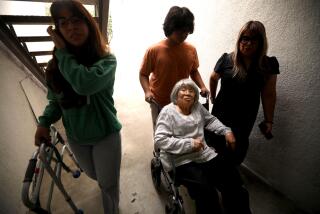Facing an aging relative’s decline
- Share via
David Church first suspected that his now-76-year-old mom’s health was deteriorating when she started complaining of a tingling sensation in her hands and upper arms. But because he lived in Newport Beach and she lived in West Virginia, he couldn’t easily judge for himself how well, or how poorly, she was doing.
Phone conversations and doctor reports weren’t enough. He finally had to go assess her health for himself.
The holidays create similar opportunities for other relatives of elderly people. But, experts on aging say, it’s important not to react too hastily if they suspect their elderly relatives have gone downhill.
Because families may have been apart for months, any decline in physical or mental health may seem all the more pronounced. Younger relatives have a sort of “snapshot” in their minds from the last time they saw their parent; that snapshot doesn’t always reflect the current reality.
Perhaps they’ll notice a ton of unread mail and a pile of uncashed checks. Or that Mom can’t seem to recall that there’s a guest room upstairs, that Dad’s car has several new dings that he can’t explain, or that Aunt Sue’s usual cheeriness has given way to ill temper or anger.
“It might have been a gradual change, but because they’ve not been around for a while, it seems dramatic,” says Donna Benton, director of the Los Angeles Caregiver Resource Center and an assistant professor of gerontology at USC.
Younger relatives often react in one of two extremes, Benton says. They might panic. Or they might go into denial, because “they don’t want to see the change in their parents, because we’re so reliant on [our parents] as our caregivers.”
She and others who work with seniors say it’s important to keep a level head when facing such a situation.
“The first step should always be a family discussion with the affected family member or parent in which you can say, ‘I’m a little concerned about [whatever it is that seems to have slipped],’ ” says Dr. Andrew Leuchter, professor and vice chairman of psychiatry at UCLA Neuropsychiatric Institute. “Sometimes it can be quite a relief for the affected person.”
For a clearer picture of the situation, younger relatives can talk to the elderly person’s friends or neighbors to see if they’ve noticed anything different in their appearance or behavior or a decline in the parent’s functioning. But concerned relatives should also know there may be a logical explanation. Perhaps the elderly person has been ill with the flu or bronchitis, which can be devastating for someone who is elderly and frail. Or perhaps the older relative has started taking a new medication that causes drowsiness or agitation.
Holiday stress can also exacerbate mental or physical problems, as can colder weather and less sunshine, which could make a person’s condition seem worse than normal at this time of year.
“Even though it’s hard to complain in Southern California, we’re kind of like plants: We just droop and lose our leaves,” says Betsy Angevine, an “elder law” attorney in Whittier to whom some younger relatives have turned for help. “When dealing with that, seniors function less well. It’s not just holiday stress and less sun, they’re often fighting depression and inertia as well.”
Even if the elderly person is in decline, younger relatives can acknowledge the problem without feeling compelled to move the person out of his or her home. They can first tap the resources of social services agencies -- such as city and county departments of aging or the 11 state-funded Caregiver Resource Centers throughout the state, as well as their local church and organizations such as the Alzheimer’s Assn. Such organizations can often make suggestions and give advice on where to turn.
Benton notes that most conditions the adult children will notice are treatable or can be alleviated with assistance from hired help. However, if the elderly person is doing dangerous things -- such as forgetting to turn off the gas stove or boiling water -- more drastic action could be necessary, and the children might have to consider alternative living situations such as assisted living or nursing homes.
In the worst-case scenario, Benton says, if the person is in danger of causing harm to himself or others and refuses to do anything to alleviate the situation, the child can anonymously call Adult Protective Services, which would typically send someone to the house -- often with a social worker -- and pressure the adult to make a safer home or go to the doctor.
When Church saw that his mom’s health had clearly declined -- and she refused to go outside her small hometown to a larger city for medical care -- he decided to bring his mother back to Newport Beach while he sought medical advice to supplement that of the small-town physicians. Her local neurologist had found nothing wrong.
He took her for a battery of tests at UC Irvine Medical Center, where physicians took her off her medications -- including an antidepressant that her general practitioner had prescribed but that seemed to agitate her. They diagnosed early-stage Alzheimer’s and put her on Aricept. That was three years ago. So far, the drug seems to have staved off further decline, Church says.
In retrospect, he says, he thinks depression was causing many of her symptoms.
“I think she realized she was getting forgetful, and that had brought on a huge depression,” Church says. “She had started experiencing all these symptoms, such as stomach cramps,” which turned out to be constipation.
After her stay of more than three months, Church and his mom decided that she would move to California. But after returning to pack up, she seemed to get back into her normal routine, enjoying daily and weekly activities. She decided to stay in West Virginia, in the house she’d lived in for 37 years.
Ultimately, Church hired a caregiver on weekdays to help his mother shower, dress, cook and clean. And though he still longs to be closer geographically to his mom, he fears that taking her out of her environment and moving her to a place where she has no friends or routine probably would cause her to deteriorate sharply.
“As long as she can function, carry on a conversation and knows what’s going on in the world, then I’ll let her live where she wants to live. I hope it can continue for three, six, 10 years, whatever, but whatever happens, she’s been able to live in her own house independently for three years, and we’re very blessed.”
More to Read
Sign up for Essential California
The most important California stories and recommendations in your inbox every morning.
You may occasionally receive promotional content from the Los Angeles Times.










